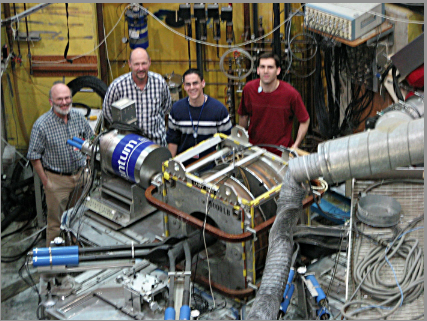
Brian Sierawski, an engineer at the Institute for Space and Defense Electronics and PhD Candidate at Vanderbilt University, regularly comes up to TRIUMF to conduct his experiments on muon-induced soft errors in electronic devices, using the lab’s surface muon beamline. Now, his work at TRIUMF’s Proton Irradiation Facility (PIF) has earned Brian the Top Student Paper award at the 2011 IEEE International Reliability Physics Symposium (IRPS).
IRPS takes place each April to share new discoveries in microelectronics reliability. Brian’s work focuses on understanding the effect of lightly-ionizing radiation events on the operation of microelectronic devices. It has been recognized for over 30 years that natural sources of radiation can cause “soft errors” which is the spontaneous switch in a memory bit from a 0 to a 1, or vice versa. Although these errors occurred in older machines, as new electronics are being built smaller, they are more sensitive to ionizing radiation. Brian’s work demonstrates a previously-unobserved error mechanism affecting the newest microelectronic devices. With the high reliability of equipment becoming ever more important, this work will have relevance to the design of data servers, medical equipment, and aerospace technology.
Brian’s work at TRIUMF takes our knowledge of this phenomenon to a new level. TRIUMF’s PIF facility offers the only muon beams in North America for these types of tests. The experimenters directed a beam of muons at SRAM memory modules and demonstrated that the resulting ionization did indeed cause soft errors. This is a development of previous perspectives in the field that focused mainly on neutrons, dismissing muons as inconsequential due to their low electronic stopping power. Indeed, it is the first time that the effect has been demonstrated with muons, positioning TRIUMF as a key research centre in learning more about the reliability of microelectronic devices. Muons occur in the natural world as a by-product of cosmic radiation striking the earth’s atmosphere.
This important research continues at TRIUMF, as we discover more about the nature of radiation-induced soft errors. The insights from experiments like these lay the foundation to ensure the reliability of future satellites, computer processors, and hospital equipment. Congratulations, Brian!
The full paper can be read at:
B. D. Sierawski, R. A. Reed, M. H. Mendenhall, R. A. Weller, R. D. Schrimpf, S.-J. Wen, R. Wong, N. Tam, and R. C. Baumann, “Effects of scaling on muon-induced soft errors,” in Proc. of the Int. Rel. Physics Symp., Apr. 2011.
-- by Aaron Lao, Communications Assistant
